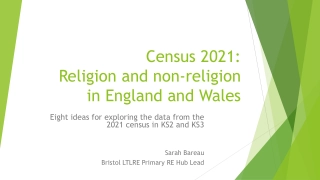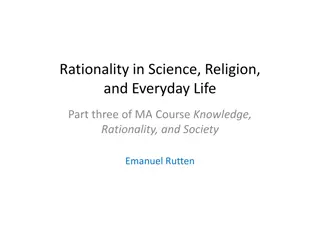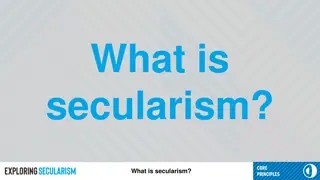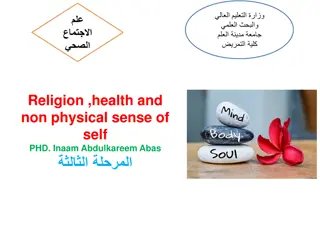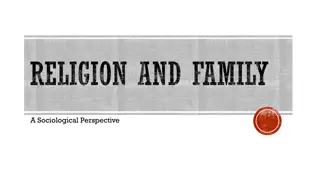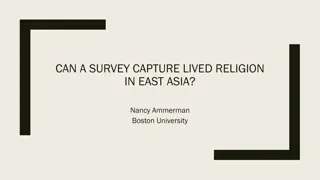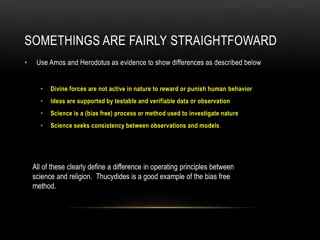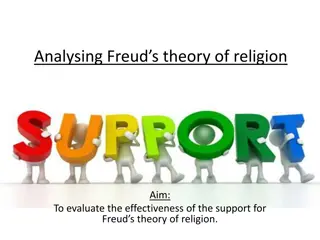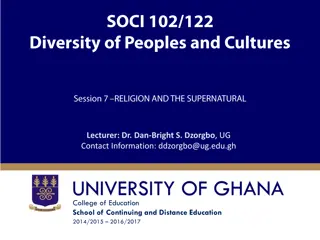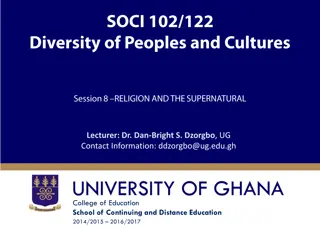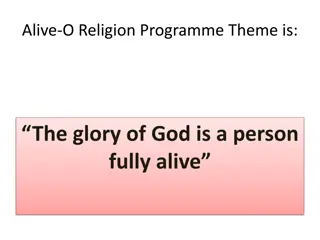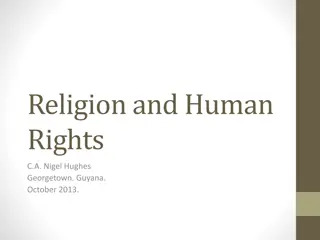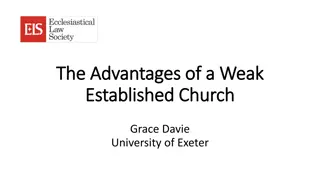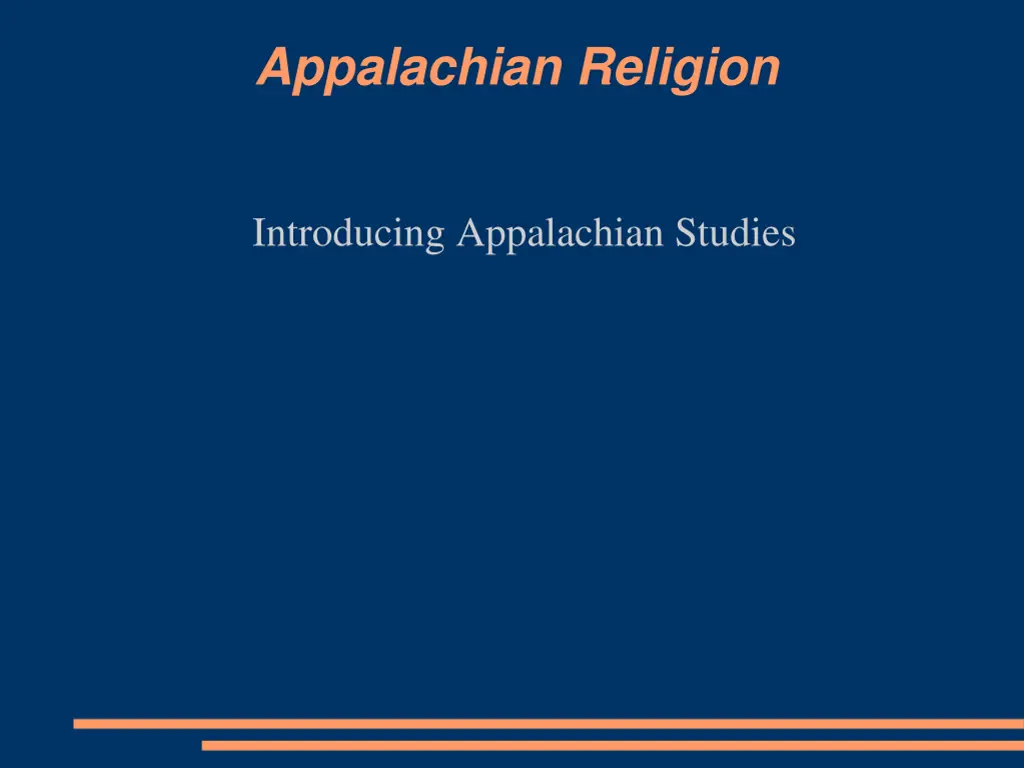
Exploring Appalachian Mountain Religion and Traditions
Discover the diverse religious landscape of Appalachia and its unique traditions rooted in history, geography, and spirituality. From the influence of Baptist and Catholic denominations to the practices of footwashing, river baptism, and even serpent handling, Appalachia's religious tapestry unveils a blend of rationalized and traditional beliefs. Explore the characteristics and distinct features that shape the Appalachian religious experience.
Download Presentation

Please find below an Image/Link to download the presentation.
The content on the website is provided AS IS for your information and personal use only. It may not be sold, licensed, or shared on other websites without obtaining consent from the author. If you encounter any issues during the download, it is possible that the publisher has removed the file from their server.
You are allowed to download the files provided on this website for personal or commercial use, subject to the condition that they are used lawfully. All files are the property of their respective owners.
The content on the website is provided AS IS for your information and personal use only. It may not be sold, licensed, or shared on other websites without obtaining consent from the author.
E N D
Presentation Transcript
Appalachian Religion Introducing Appalachian Studies
A few notes... Appalachian Mountain Religion: A History by Deborah Vansau McCauley - excellent resource Religion in Appalachia is as diverse as the landscape it encompasses (179). Baptist, Methodist, Catholic, Zen Buddhist, Wiccan, etc. By order of decreasing percentages: Baptist (21%), Catholic (13%), Methodist (9%) Appalachian religion is a product of history, geography, and spirituality (179).
Sect vs. Church Informal/experiential worship congregational/democratic called clergy Laity active and participatory Rejectionist stance to culture Pessimistic/premillenial Believer baptism Formalistic/structured Hierarchical Professional clergy Laity have minimal role Accomodationist stance to culture Optimistic/post-millennial Infant baptism
Rationalized vs. Traditional Rationalized religion: apart... above... outside of ordinary life; individualistic Traditional religion: the sacred is found everywhere ; collective religion
Some Characteristics Footwashing Communion or sacrament Immersion baptism in living water Glossolalia or speaking in tongues Individualistic, personal relationship with God Bi-vocational, non-seminary-trained ministers Holy Spirit led services letting the spirit take over
Some Characteristics (continued) Rhythmic preaching style Independent congregations - Each church holds the key to its own door (180). Many aren't formal organizations Loose organization locally/regionally Fatalism Based on oral tradition Serpent and fire handling, poison drinking
Footwashing and River Baptism German Baptists, often called Dunkards, help to create these traditions in Appalachia Often separated into male/female footwashings River baptisms are still practiced in many congregations
Serpent Handling Practiced by few congregations within the region George Hensley is credited with creating this tradition in the early 1900s in Tennessee Literal interpretation of the Bible Mark 16:17-18: "And these signs shall follow them that believe: in my name they shall cast out devils; they shall speak with new tongues: they shall take up serpents and if they drink any deadly thing, it shall not hurt them; they shall lay hands on the sick and they shall recover. If bitten, often will notdo not seek medical attention Controversial practice, but often overlooked
John Calvin French Protestant theologian during protestant Reformation of 1500s Belief in total sovereignty of God humans act according to God's will Belief in theocracy society should be governed by God Leads to Puritanism in the US Jonathan Edwards and Great Awakening bring Calvinism to Appalachia Sinners in the Hands of an Angry God - Popular sermon from 1741 highlighting the return to Calvinism
Principles of Calvinism Total sovereignty of God TULIP Total depravity (original sin) Unconditional election Limited atonement Irresistable grace Perseverance of saints
Great Awakening Jonathan Edwards Revivals, revivals, and more revivals Purpose: revive the faithful Return to strict Calvinism Appeal to human emotions and feelings Experiential side of worship Eventually filtered to Appalachia
Great Revival Jacob Arminius God's grace available to all people choice of acceptance Not fatalistic Charles Finney Fierce preacher pointed out sin in public, direct eye contact Began the altar call idea Again, revivals, revivals, revivals
Old-Time Baptists Primitive Baptists Primitive Baptist Universalists Regular or Old Regular Baptists Regular Predestinarian Regular Primitive United Baptists Separate Baptists in Christ Free Will Free Will Baptists Howard Dorgan These exist only in Appalachia
John Wesley Developed Methodists (Methodism) and some Holiness Belief in predestination, but since God has ultimate forethought, He knew who would believe in Him Sanctification - Christian perfection Not necessary for salvation, but desired
Holiness Movements Experiential, often ecstatic worship services Glossolalia, interpretation, physical abandon, healing, trance, prophecy Physical and spiritual experience necessary Began in East TN and western NC Snake handling comes from desire for greatest experience possible, but serpent handling is only a small part of the Holiness Movement Church of God (Cleveland, TN) - example
Primitive Baptist Universalists Often called No-Hellers, but this is a misnomer Beliefs: Adamic sin sinfulness is a characteristic of humanity Satan is natural man warring with spiritual man - no existence beyond temporal world Original sin leads to punishment of this world and, ultimately, death Physical death and death as separation from God Christ's atonement required to compensate
Primitive Baptist Universalists (continued) All of humankind punished by Adamic sin, so all humankind will receive atonement Elect which serves as a witness for Christ and earthly preserver of His righteousness Elect can sin, but possibly feel it more profoundly Death brings an end to all sin and judgment All go to a totally egalitarian heaven No hell after resurrection since hell is only part of temporal world


